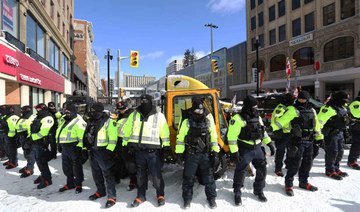DUBAI: A security guard subcontracted to work for Canada’s Via Rail has been suspended pending investigation after asking a Muslim man not to pray at an Ottawa train station.
CTV News Ottawa on Thursday reported that the worshipper, who identified himself only as Ahmad, had just finished praying in an empty hallway when the guard approached him and said, “don’t pray in here … Pray outside next time.”
Ahmad told the news channel that the incident happened on Monday at the station in the Canadian capital.
According to Ottawa Citizen news website, a video of the incident that went viral showed the guard in his security vest telling the man that his prayers were disturbing other station users.
Via Rail issued an unreserved apology to the man and the entire Muslim community and promised a full investigating and “appropriate actions” based on its findings.
Following a meeting to discuss what was described as a “regrettable and saddening incident,” Via Rail and the National Council of Canadian Muslims, a civil rights and advocacy group, issued a joint statement that said the two parties had held constructive talks and that the operator was working to improve its diversity and inclusion policies.
“The conversation focused on common objectives, namely, to ensure that Via Rail provides an inclusive environment where passengers and employees feel safe practicing freedom of religion, including the ability to worship,” the statement added.
The guard also reportedly told Ahmad, “we don’t want you praying here. You’re bothering our other customers, OK?”
Ahmad told CTV News that he was left feeling shocked, hurt, and disrespected.
He said: “He made me feel embarrassed. I was just disgusted. Like, this is Canada? This is the nation’s capital? This is Ottawa?”
Via Rail officials noted that the firm would be sharing its diversity and inclusion policies with the NCCM and would work with the group on “any improvements that could be brought to help prevent these incidents in the future.”
The railway company also pointed out that it strongly condemned Islamophobia and any discriminatory behavior.
The security guard was not an employee of Via Rail, but a spokesperson said the firm had asked its subcontractor to remove him from all Via Rail contracts pending the outcome of the investigation.
The NCCM has since been in contact with Ahmad.
Muslim man asked not to pray inside Ottawa train station
Short Url
https://arab.news/vvz4d
Muslim man asked not to pray inside Ottawa train station

- Viral video of incident showed guard in security vest telling man prayers were disturbing other people
- Via Rail issued unreserved apology to Muslim community, promised full investigation













